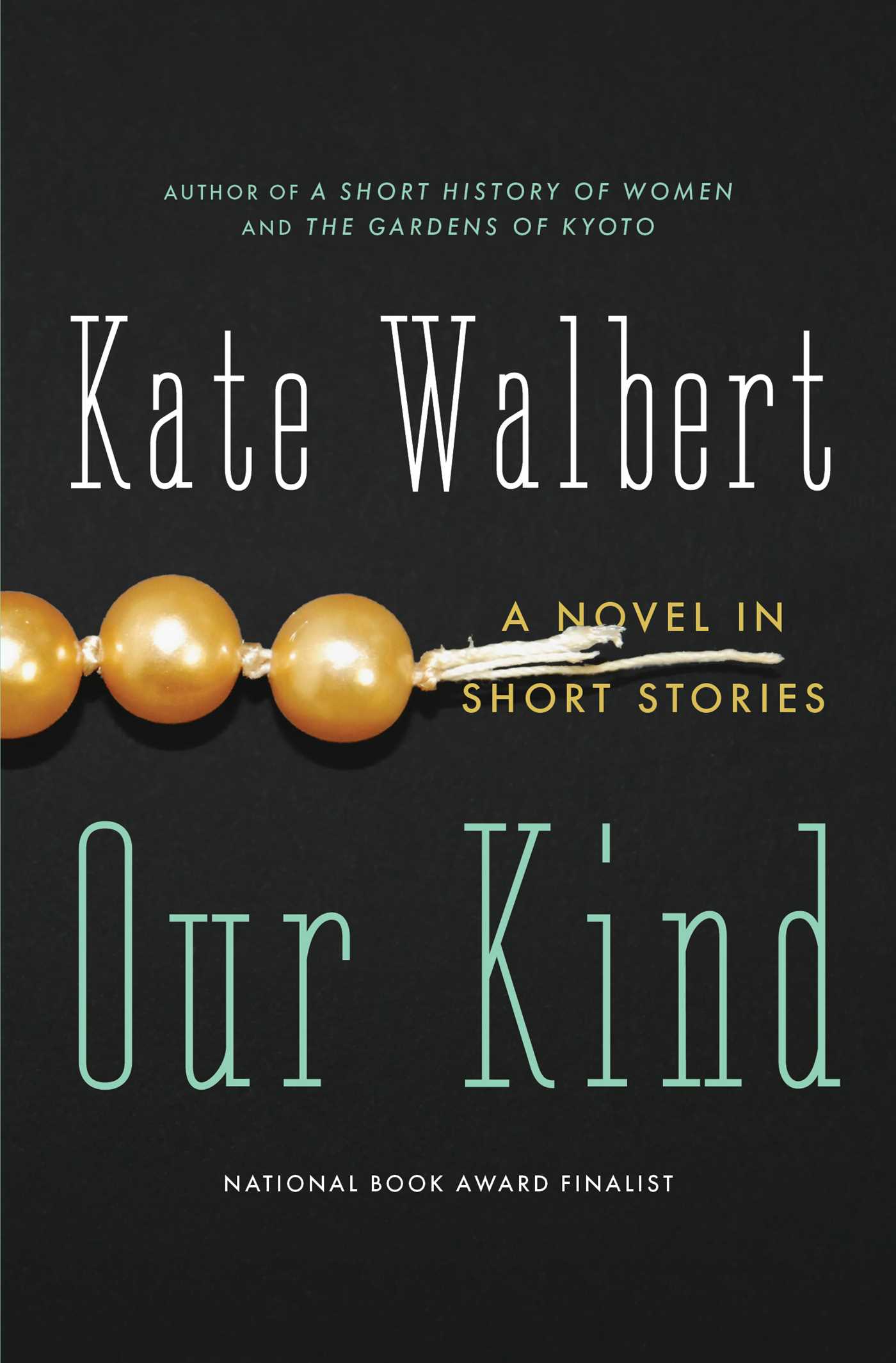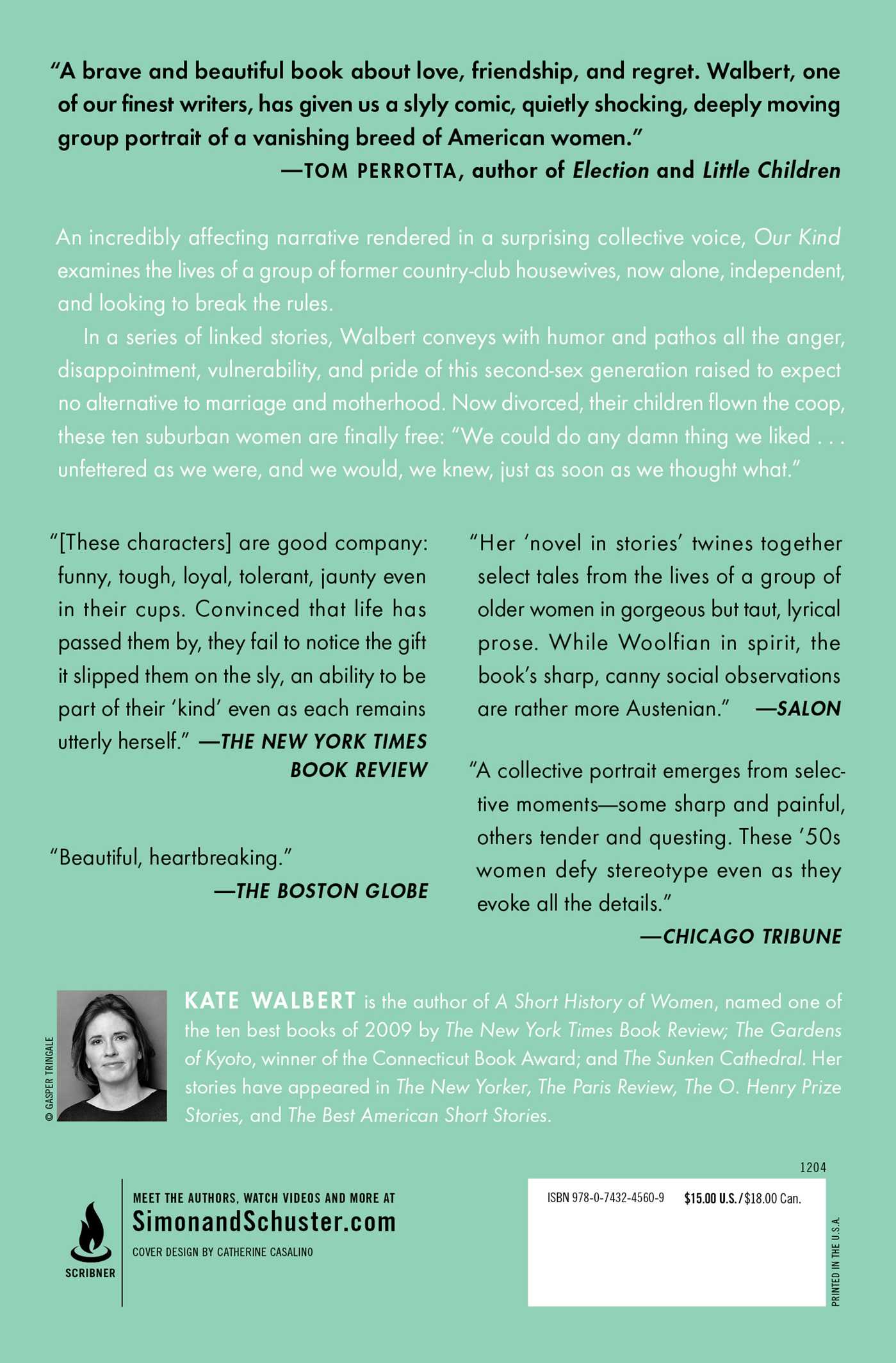Plus, receive recommendations and exclusive offers on all of your favorite books and authors from Simon & Schuster.
Table of Contents
About The Book
In Our Kind, Kate Walbert masterfully conveys the dreams and reality of a group of women who came into the quick rush of adulthood, marriage, and child-bearing during the 1950s. Narrating from the heart of ten companions, Walbert subtly depicts all the anger, disappointment, vulnerability, and pride of her characters: "Years ago we were led down the primrose lane, then abandoned somewhere near the carp pond."
Now alone, with their own daughters grown, they are finally free—and ready to take charge: from staging an intervention for the town deity to protesting the slaughter of the country club's fairway geese, to dialing former lovers in the dead of night.
Walbert's writing is quick-witted and wry, just like her characters, but also, in its cumulative effect, moving and sad. Our Kind is a brilliant, thought-provoking novel that opens a window into the world of a generation and class of women caught in a cultural limbo.
Reading Group Guide
Get a FREE ebook by joining our mailing list today! Plus, receive recommendations for your next Book Club read.
2. Who are "Our Kind"? What kind of women are they? How does the narration, language and style reflect or enhance the story and the characters? Share an example that you find particularly effective.
3. In "The Intervention," what does it mean when the narrator says, "we've seen a lot, it's true, but know so little. How were we to learn? Years ago we were led down the primrose lane, then abandoned somewhere near the carp pond"? What is the significance of the intervention? At the chapter's end, why does the narrator say, "We must save Him, quick. But first, no. We must save ourselves"?
4. What is your response to Esther, in "Esther's Walter"? Do the women really "love" her? Share your reactions to the group's discussions while at Esther's. How do their actions speak louder than words? Why is Walter's portrait important, and what does it represent? Discuss Esther's "surprise." Compare what happened at the intervention and at Esther's and discuss what these events tell you about the group.
5. Describe Bambi in "Bambi Breaks for Freedom." What does Remington Jackson represent? What does her desire to see him represent?
6. To what does "Screw Martha" refer? What is symbolic about the perception of, and what is to be done to, the geese at the country club? Consider the paragraph near the end of "Screw Martha" that reads, "She tilts the hard hat to show us the egg...dead." How is the information in the passage imparted? Is the narrator reliable here? Why? Why does the narrator wish "Barbara silent a bit longer," to "return...to our green oasis, to the girls in their snowsuits...."?
7. What is the significance of the group gathering at the summer solstice in "Come As You Were"? What does this chapter title mean? After the sentence, "I hid in the armoire and wept, Gay begins", there is a long parenthetical statement: "(What she needs is friends,...lover.)." What is its significance? What affect does this have on your understanding of the story, and the women in it?
8. In "Sick Chicks," focus on the paragraphs beginning, "The group has not entirely assembled..." to "...the butter tong." Consider the way the author describes the women entering the room, and the room itself. What, if any, is the symbolism here? What makes Mrs. Dalloway particularly good for the book discussion group at the hospice? What is Viv's role in the discussion? Why is this scene set at a hospice?
9. Who are the "warriors" in the chapter with that title? Why is Louise considered, "not of our set"? Do you think it's odd that the group admits "we never knew a thing about Louise Cooper, or for that matter, any of our pasts? We look ahead and speak of present things...". Does this fit with what you know of the characters? What, if anything, is significant about Louise's mask, her being photographed like a Madonna and then her water breaking?
10. In "Back When They Were Children," what do the words lost halcyon days represent to these women? Why are the words italicized? Are the mothers very involved in their children's lives? In one another's lives? To what does the chapter's last line refer -- "We've been told the dance will begin"?
11. In "The Hounds, Again," the geese are mentioned again -- "it is only a matter of time before the geese lose their fight." What is really being discussed? To what does the chapter's title refer? Who is the narrator talking about when she says, "it's Him we are remembering, Him we will return to"? Look at the paragraph, "But now He does not look at her,...His slipping tongue." Discuss what is going on and how Walbert captures this all-to-common event in a woman's life, and whether or not she does so successfully.
12. In "The Beginning of the End," Professor Dipple tells Viv: "You might very well read a book from time to time....It will fade into fuzzy thinking." What is she saying? What is Viv's response? What is Viv recognizing here, at this turning point in her life? Why does Viv think, "What possibly else" would she do but get married? What does it mean when the narrator says, "The few times we speak of true things it is almost unbearable"? What "true things" are unbearable?
13. Discuss the book's last line -- why does Viv say this moment is "the beginning of the end"?
14. Looking at the book's structure, do the chapters work well independently? How are they tied together? Could you change their order and still make the book work?
15. What time and place does Our Kind concern itself with? How does Walbert signpost the era (pop culture references, political references, hair styles, etc)? Discuss the cultural and generational limbo they find themselves in. Are these women angry about the course of their lives? If not angry, then what do they feel?
Product Details
- Publisher: Scribner (December 28, 2004)
- Length: 208 pages
- ISBN13: 9780743245609
Browse Related Books
Raves and Reviews
Praise for Our Kind
“[W]ry and compressed, full of quick, telling details....I can't think of another contemporary novel except James Salter's Light Years that so zealously grapples with the passage of time as a subject....[S]tartling and cumulative [in its] heft.”
—Jennifer Egan, The New York Times Book Review
“A collective portrait emerges from selective moments—some sharp and painful, others tender and questing. These '50s women defy stereotype even as they evoke all the details.”
—Chicago Tribune
“Her "novel in stories" twines together select tales from the lives of a group of older women in gorgeous but taut lyrical prose. While Woolfian in spirit, the book's sharp, canny social observations are rather more Austenian.”
—Salon
“There's no denying Walbert's talent -- or her ambition.”
—Newsday
“[E]xquisite. [T]his gang is the most inviting. They are good company: funny, tough, loyal, tolerant, jaunty even in their cups. Convinced that life has passed them by, they fail to notice the gift it slipped them on the sly, an ability to be part of their "kind" even as each remains utterly herself.”
—Laura Miller, The New York Times Book Review
“Our Kind is the book you read along with Updike and Cheever...touching and often surreal. Walbert writes...with insight and compassion.”
—The Washington Post
“Beautiful, heartbreaking...[The characters] are free and unfettered.”
—The Boston Globe
“[T]he 1950s women of Walbert's "novel in stories," Our Kind, are a dying breed; but she insists, rightly, on the viability of their ambition-nipped lives.”
—Village Voice
“[A] crystalline second novel, "Our Kind combines a wistful lyricism with wry humor in its portrayal....Like her characters, her prose style is consistently elegant and possessed of a surprising strength-due in large part to the novel's authoritative, first-person-plural narrative voice....[A] startling, aching beauty...Kate Walbert's keen-eyed social observations (not unlike Jane Austen's)...really sparkle. I look forward to more of them in her next book.”
—Amanda Kolson Hurley, The Washington Times
“These ten connected stories pull together with the force of a novel, drawing a picture of a group of country club women, left by their husbands for younger brides, abandoned by their children, but forging a life out of friendships and habit....Wry observations, witty insights and pithy descriptions capture a specific society but tell us all something about our own...There is a poignancy here.”
—Charlotte Observer
“Brilliant...Walbert's characters are caught like insects in amber as they make late-in-life discoveries no school could ever teach. Brittle, funny and poignant, this is a prickly treat.”
—Publishers Weekly (starred review)
“Whole lives-a generation, an era-are handled with grace, deftness, and skill...Then-and-now prose pieces that, at their best, are among the finest there can be.”
—Kirkus
“Kate Walbert's dazzling novel has the elegiac grace and wisdom-and also the wistfulness-of a John Cheever story. The collective narrative voice gives the novel a breathtaking authority. The tragedy of these empty, prosperous lives could make this a cruel farce were it not so delicately and deliciously rendered into something far finer. What a marvelous book.”
—Katharine Weber, author of The Music Lesson and The Little Women
“Our Kind is a brave and beautiful book about love, friendship, and regret. In this remarkable novel, Kate Walbert, one of our finest writers, has given us a slyly comic, quietly shocking, deeply moving group portrait of a vanishing breed of American women.”
—Tom Perrotta author of Election and Little Children
Awards and Honors
- National Book Award Finalist
Resources and Downloads
High Resolution Images
- Book Cover Image (jpg): Our Kind Trade Paperback 9780743245609
- Author Photo (jpg): Kate Walbert Deborah Donenfeld(0.1 MB)
Any use of an author photo must include its respective photo credit


















